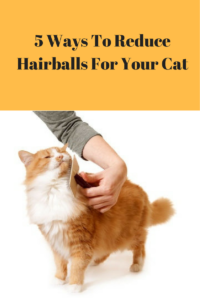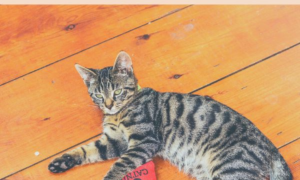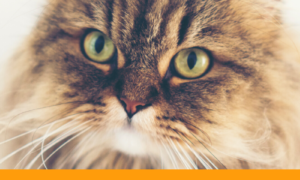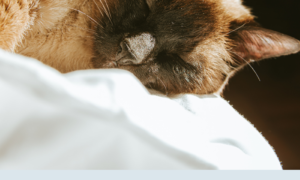
Hairballs are a fact of life with cats because of the amount of grooming they do daily. The hairball is often vomited, but that’s not pleasant for you or your cat. With today being Hairball Awareness Day, we wanted to share some tips to reduce the amount of hairballs your cat, and you, have to deal with on a regular basis.
Brush Your Cat Daily
Regular brushing reduces the amount of loose hair that may be swallowed during your cat’s daily grooming. It also gives you a chance to bond with your cat with some one-on-one time.
Reduce Your Cat’s Stress
If your cat is stressed, he will tend to groom more, therefore swallowing more hair and having more hairball problems.
Add More Fiber To Your Cat’s Diet
Adding a bit of pumpkin or sweet potato to your cat’s diet will help him pass the hairball easier through his digestive system. Since you’ll give just a small amount at a time, the jarred baby food variety of sweet potato or pumpkin works well. Check the label to be sure there’s no added sugar or salt. Consult your veterinarian on the amount and frequency to feed.
Hairball Formula Diet
Many pet food companies have special hairball reduction formula
Natural Or Commercial Hairball Preventative
Adding fish oil to your kitty’s diet not only helps to move a hairball along in her system, but will also add some shine to her coat. If you notice your kitty trying to vomit up a hairball, mix a teaspoon of fish, flax or safflower oil into her canned kitty food daily.
I recommend using natural options whenever possible, but there are also several hairball preventatives on the market in a variety of flavors like tuna, salmon or malt. These products are mineral oil based and act like a laxative. Consult your veterinarian on the amount and frequency for your cat. These products are easy to administer, they are a gel that is simply squeezed out of a tube. Many cats will lick the gel off your finger, or in the case of one cat I know, off the bathtub surface.
Hairballs can be very serious if not coughed up or passed through your cat’s digestive system. They can become lodged in the intestines and cause blockage.
Be aware that a remedy that works for one cat may not work for another. Don’t be discouraged if a remedy you try doesn’t work, it might a few tries to find the answer for your cat.
If you notice your cat is not having bowel movements, or is having a very difficult time with them, he may have a blockage due to hairballs. Consult your veterinarian as soon as possible to address the problem. Having him cough up hairballs isn’t pleasant, but the alternative may be much worse!
This post was previously published and has been updated for format and content





